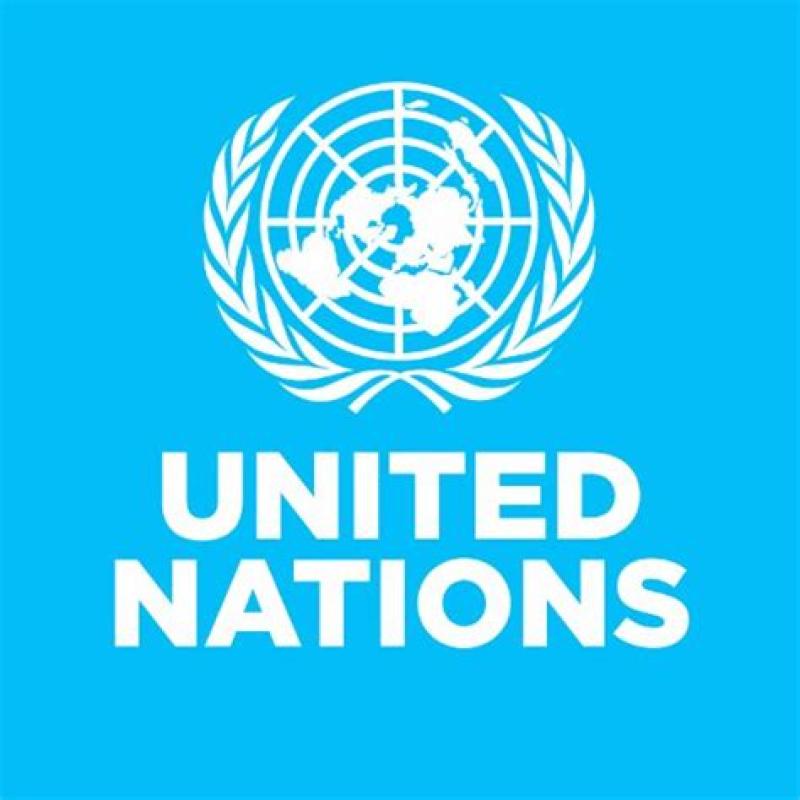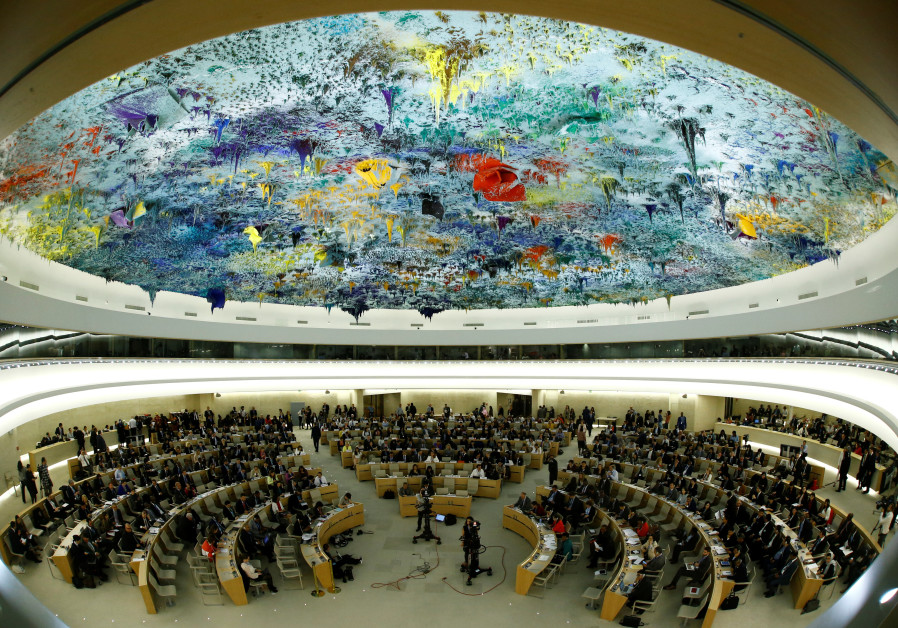UN REPORT ALARMED BY GROWING ANTISEMITISM, CRITICIZES BDS



UN REPORT ALARMED BY GROWING ANTISEMITISM, CRITICIZES BDS
The interim report, which the Israeli mission to the UN called "unprecedented," identified antisemitism from all sides of the political spectrum and called for action.
BY OMRI NAHMIAS, JERUSALEM POST STAFF SEPTEMBER 24, 2019

Overview of the United Nations Human Rights Council is seen in Geneva, Switzerland June 6, 2017.. (photo credit: REUTERS)
WASHINGTON – The United Nations released an interim report by the Special Rapporteur on freedom of religion or belief on Monday, in which he says he is “alarmed by the growing use of antisemitic tropes by white supremacists including neo-Nazis and members of radical Islamist groups in slogans, images, stereotypes and conspiracy theories meant to incite and justify hostility, discrimination, and violence against Jews.”
Ahmed Shaheed, the Special Rapporteur on freedom of religion or belief, is an independent expert appointed by the UN Human Rights Council. He submitted his report to the Human Rights Council in accordance with General Assembly resolution.
His report, which the Israeli mission to the UN called “unprecedented,” identified antisemitism from all sides of the political spectrum and called for action.
He raised rare criticism for a UN official regarding the Boycott, Divestment and Sanctions movement, writing that “international law recognizes boycotts as constituting legitimate forms of political expression and that non-violent expressions of support for boycotts are, as a general matter, legitimate speech that should be protected.”
However, he stressed that “expression which draws upon antisemitic tropes or stereotypes, rejects the right of Israel to exist, or advocates discrimination against Jewish individuals because of their religion, should be condemned.”
“The Special Rapporteur takes note of numerous reports of an increase in many countries of what is sometimes called ‘left-wing’ antisemitism, in which individuals claiming to hold anti-racist and anti-imperialist views employ antisemitic narratives or tropes in the course of expressing anger at policies or practices of the Government of Israel,” Shaheed added. “In some cases, individuals expressing such views have engaged in Holocaust denial; in others, they have conflated Zionism, the self-determination movement of the Jewish people, with racism; claimed Israel does not have a right to exist and accused those expressing concern over antisemitism as acting in bad faith.”
Shaheed suggested that the UN plays a “vital role” in combating antisemitism and engaging global Jewish communities.
“The Secretary-General should consider appointing a senior-level focal point in the Office of the UN Secretary-General with responsibility for engaging with the Jewish communities worldwide, as well as monitoring antisemitism and the response of the UN there too,” Shaheed said.
Shaheed added that he identifies violence, discrimination, and expressions of hostility motivated by antisemitism “as a serious obstacle to the enjoyment of the right to freedom of religion or belief.”
“The Special Rapporteur notes with serious concern that the frequency of antisemitic incidents appears to be increasing in magnitude in several countries where monitors attempt to document it, including online,” he said. “The prevalence of antisemitic attitudes and the risk of violence against Jewish individuals and sites appear to be significant elsewhere, including countries with little or no Jewish population.”
He found that these incidents have created a climate of fear among “a substantial number of Jews, impairing their right to manifest their religion,” and that “discriminatory acts by individuals and laws and policies by governments have also had a negative impact.”
“The Special Rapporteur stresses that antisemitism if left unchecked by governments, poses risks not only to Jews but also to members of other minority communities,” he added. “Antisemitism is toxic to democracy and mutual respect of citizens and threatens all societies in which it goes unchallenged.”
He urged states, civil society, the media and the UN to follow “a human rights-based approach to combating antisemitism,” and called for investments in education and training to enhance society-wide literacy about the different ways in which antisemitism manifests itself.
Danny Danon, Israel’s ambassador to the UN, praised the report.
“The report reflects the organizational change toward Israel,” Danon said. “The assertion that the BDS movement encourages antisemitism is an important UN statement.”
The report marks “one of the first times the UN has addressed the issue of antisemitism in any detail, according to Anne Herzberg, legal adviser and UN liaison at the Jerusalem-based NGO Monitor.
“Importantly, the Rapporteur also recommends the IHRA definition as a useful tool in combating antisemitism,” Herzberg said. “Hopefully, UN bodies, particularly the Human Rights Council, will follow the Rapporteur’s lead by adopting IHRA and ending their promotion of antisemitic tropes and attacks on Israel’s legitimacy.”
Tags
Who is online
54 visitors

I posted this under 'Stranger Than Fiction" because it is so far removed from the general attitude of the United Nations that it is almost unbelievable. I'm sure he'll be fired by stating something so contrary to the UN bias.
IHRA = International Holocaust Remembrance Alliance, describing the Plenary Session of the International Holocaust Memorial Alliance in Budapest, 2015.
Its definition of antisemitism:
This definition has been adopted by most of the civilized nations of the world, including the USA
In the spirit of the Stockholm Declaration that states: “With humanity still scarred by …antisemitism and xenophobia the international community shares a solemn responsibility to fight those evils” the committee on Antisemitism and Holocaust Denial called the IHRA Plenary in Budapest 2015 to adopt the following working definition of antisemitism.
On 26 May 2016, the Plenary in Bucharest decided to:
Adopt the following non-legally binding working definition of antisemitism:
“Antisemitism is a certain perception of Jews, which may be expressed as hatred
toward Jews. Rhetorical and physical manifestations of antisemitism are directed
toward Jewish or non-Jewish individuals and/or their property, toward Jewish
community institutions and religious facilities.”
To guide IHRA in its work, the following examples may serve as illustrations:
Manifestations might include the targeting of the state of Israel, conceived as a Jewish
collectivity. However, criticism of Israel similar to that leveled against any other country cannot be regarded as antisemitic. Antisemitism frequently charges Jews with conspiring to harm humanity, and it is often used to blame Jews for “why things go wrong.” It is expressed in speech, writing, visual forms and action, and employs sinister stereotypes and negative character traits.
Contemporary examples of antisemitism in public life, the media, schools, the workplace, and in the religious sphere could, taking into account the overall context, include, but are not limited to:
Calling for, aiding, or justifying the killing or harming of Jews in the name of a radical ideology or an extremist view of religion.
Making mendacious, dehumanizing, demonizing, or stereotypical allegations about Jews as such or the power of Jews as collective — such as, especially but not exclusively, the myth about a world Jewish conspiracy or of Jews controlling the media, economy, government or other societal institutions.
Accusing Jews as a people of being responsible for real or imagined wrongdoing committed by a single Jewish person or group, or even for acts committed by non-Jews.
Denying the fact, scope, mechanisms (e.g. gas chambers) or intentionality of the genocide of the Jewish people at the hands of National Socialist Germany and its supporters and accomplices during World War II (the Holocaust).
I'm sure he'll be fired by stating something so contrary to the UN bias.
That was my first thought as well...as soon as I read it!
A while back I had a friend who used to work in the UN. She told me stories that surprised me-- not only of how prevalent anti-Semitism was there, but also, BTW, of the extreme sexism that was so prevalent. And both were tolerated by administrators.
Actually that should come as no surprisae, as staff came from all over the world-- many from countries were various forms of bigotry were deeply ingrained in their culture.(Especisally in many parts of Africa and Asia).